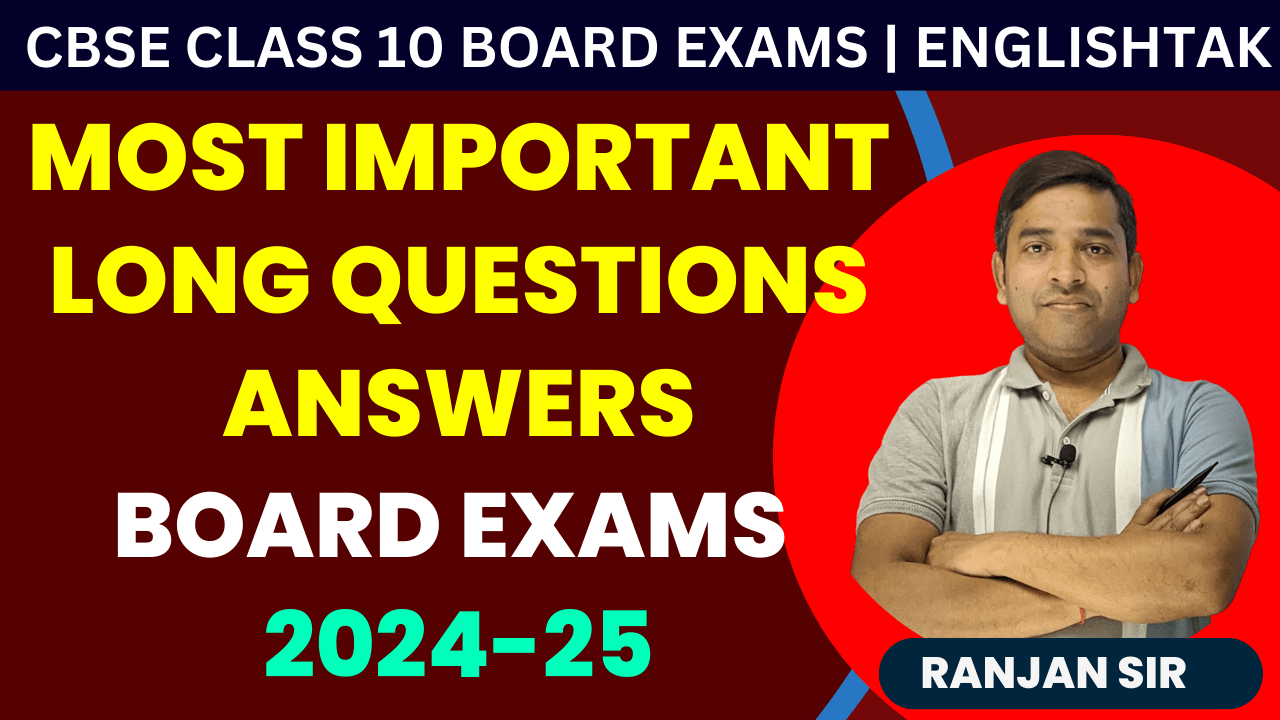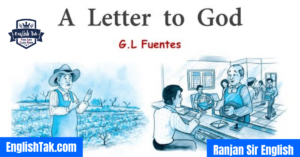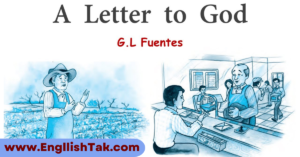![]()
CBSE Class 10 English Long Question Answers for Board Exams
CBSE Class 10 English Long Question Answers for Board Exams – A collection of most important Long Questions Answers for Upcoming CBSE Class 10 Board Exams 2024-25. As CBSE Board exams are approaching, these questions will help you understand the pattern of Board exams.
Join Our Group
CBSE Class 10 English Long Question Answers for Board Exams
Answer following two questions, in about 100-120 words.
(i) Imagine the steadfast faith of Lencho in “A Letter to God” and the optimism of Anne Frank in “The Diary of Anne Frank.” How do these characters maintain hope amidst adversity? Discuss the role of their beliefs and positive outlooks in helping them endure challenging circumstances in about 120 words.
Answer: In “A Letter to God,” Lencho demonstrates unwavering faith in God, believing that divine help will come despite the destruction of his crops. His optimism drives him to write a letter to God, confidently requesting assistance to sustain his family. Lencho’s strong belief in the benevolence of God helps him maintain hope amidst his adversity.
Similarly, Anne Frank, in “The Diary of Anne Frank,” maintains her optimism while hiding from the Nazis during World War II. Despite the constant fear and uncertainty, she writes about her dreams and the goodness in people, believing in a better future. Anne’s positive outlook and faith in humanity help her endure the challenges of her situation, showcasing how belief and hope can provide strength during the darkest times.
(ii) In “A Tiger in the Zoo,” the poet contrasts the life of a tiger in captivity with that in the wild. Imagine you are the tiger in the zoo. Describe your feelings about being in captivity, in about 120 words. What would you long for, and how would you cope with your situation?
Answer: As a tiger in the zoo, I feel a deep sense of confinement and frustration. My once mighty form, powerful and free, now roams a small enclosure, surrounded by iron bars. I watch the world outside with longing, yearning for the thrill of the wild—the vast forests, the freedom to run, and the instinctual chase of my prey.
The sounds of laughter from visitors remind me of my isolation, making me feel like a mere spectacle rather than the majestic creature I am. To cope with my situation, I retreat into my thoughts, recalling the scents and sounds of the jungle. I try to find moments of peace in my small space, but deep down, I dream of the day I can feel the wind on my face and roam freely again.
(iii) Evaluate the theme of appearances versus reality in “The Midnight Visitor” How does Ausable’s appearance and behavior surprise Fowler, who expected a typical secret agent? Discuss how Ausable’s clever handling of the situation with Max shows what makes a good spy.
Answer: In “The Midnight Visitor,” the theme of appearances versus reality is central to the story. Ausable’s unassuming appearance—a small, plump man—contrasts sharply with Fowler’s expectation of a typical secret agent, who is usually portrayed as tall and athletic. This surprise reveals that true strength lies not in physicality but in intellect and resourcefulness.
When confronted by the intruder Max, Ausable cleverly improvises by claiming that a balcony exists in his room, creating a sense of urgency and fear in Max. His calm demeanor and quick thinking not only defuse the threat but also demonstrate that a good spy relies on wits rather than looks. Ausable’s ability to navigate danger showcases the importance of cunning and mental agility in espionage.
(iv) If Mrs. Pumphrey from “A Triumph of Surgery” were to meet Anil from “The Thief’s Story, how might their conversation about care and responsibility unfold? Considering their differing experiences with Tricki and Hari Singh, what advice might they offer to each other?
Answer: If Mrs. Pumphrey from “A Triumph of Surgery” met Anil from “The Thief’s Story,” their conversation would center on care and responsibility. Mrs. Pumphrey might express her initial overindulgence with Tricki, explaining how her love led to his poor health, urging Anil to understand that too much pampering can harm. She might advise him to be more mindful of how he nurtures those he cares for.
In return, Anil could share his experience with Hari Singh, emphasizing the importance of trust and independence. He might suggest that true care involves allowing others to grow and learn from their mistakes. Both would realize that balance is key—between love and discipline, nurturing and letting go—to foster genuine well-being and growth.
(v) Lencho’s complete dependence on rain for a good harvest and nature turning hostile has become a nightmarish experience for farmers in India too. What do you think are other viable options for farmers to mitigate the impact of such calamities on livelihoods and economies? (A letter to God)
Answer: To mitigate the impact of calamities like droughts or floods on farmers’ livelihoods and economies, several viable options can be implemented.
First, crop diversification can reduce dependence on a single harvest by allowing farmers to plant various crops that may withstand adverse conditions. Second, adopting efficient irrigation systems, such as drip or sprinkler irrigation, can ensure adequate water supply, lessening reliance on rain.
Utilizing technology, like weather forecasting apps, can help farmers make informed decisions about planting and protecting their crops.
Additionally, improving soil management through practices like crop rotation enhances resilience to extreme weather.
Lastly, accessing financial support through government schemes and crop insurance can provide essential safety nets. By adopting these strategies, farmers can better withstand nature’s unpredictability and safeguard their livelihoods.
(vi) How does the conflict in Gaza and the war between Russia and Ukraine illustrate a shift from peace towards conflict and strife, in the present times? Discuss this in context of the themes presented in the poem, Fire and Ice by Robert Frost.
Answer: The conflicts in Gaza and the war between Russia and Ukraine exemplify a troubling shift from peace to violence, reflecting the themes of destruction in Robert Frost’s poem “Fire and Ice.” The poem explores two destructive forces: desire and hatred. The ongoing conflicts highlight how deep-rooted desires for power and control can escalate into hatred and warfare, leading to devastating consequences.
Just as Frost suggests that both fire (desire) and ice (hatred) can lead to destruction, these conflicts demonstrate how human emotions can fuel violence and conflict. The suffering and loss experienced in these regions resonate with Frost’s message, emphasizing that unchecked passions and animosities can threaten global peace, ultimately leading humanity toward its own downfall.
(vii) No one is a born thief. It’s circumstances, compulsion or temptation that overpowers one’s logic at times Regret is a catharsis that must be acknowledged. Explain this with reference to the lesson “The Thief’s Story’.
Answer: In “The Thief’s Story,” the notion that no one is a born thief is illustrated through Hari Singh’s character. Circumstances, such as poverty and lack of opportunities, drive him to steal to survive. His initial actions are guided by temptation and a desire for quick wealth, overpowering his sense of right and wrong. However, as he interacts with Anil, he begins to feel regret for his choices, acknowledging the emptiness of his actions.
This regret serves as a catharsis, pushing him to reconsider his life path. Anil’s kindness and trust inspire Hari to embrace honesty, showcasing that while circumstances can lead one astray, recognizing and confronting regret can pave the way for redemption and positive change.
(viii) How does the theme of science and its consequences manifest in the story ‘Footprints Without Feet?”
Answer: In “Footprints Without Feet,” the theme of science and its consequences is prominently illustrated through the character of Griffin, a scientist who discovers the secret of invisibility. While his scientific achievement demonstrates human ingenuity and the potential for groundbreaking discoveries, it also highlights the darker side of scientific pursuits when used irresponsibly.
Griffin’s invisibility allows him to commit crimes, revealing how scientific advancements can lead to ethical dilemmas and unintended consequences. His misuse of his invention for selfish gain results in chaos and conflict, ultimately leading to his downfall. The story warns of the potential dangers when scientific discoveries are divorced from moral responsibility, suggesting that with great power comes the need for accountability and ethical considerations.
English For CBSE Class 10 Board Exams
Dust of Snow Summary and Theme
Dust of Snow Explanation and Poetic Device
Fire and Ice Poem Summary and Theme
Two Stories about Flying Very Short Questions
How I Taught My Grandmother to Read Extra Question Answers
Essay on Teacher’s Day in English
The Merchant Of Venice Questions & Answers





